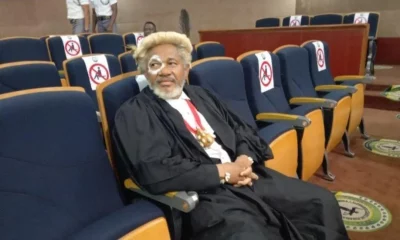Embattled Yoruba Nation agitator, Sunday Adeyemo, better known as Igboho, standing trial in the Benin Republic has told the court that he fled Nigeria to avoid being killed.
Igboho, who was arrested on July 19 with his wife while attempting to travel to Germany, has been charged with illegal entry into the neighbouring West African country.
He is also explaining his mission in Cotonou, the Benin Republic capital.
The court ruled that he should be relocated to prison from police custody.
Igboho’s lawyer, David Ibrahim Salami, disclosed what transpired at the Benin Court of Appeal on Monday where the agitator appeared before three judges.
He was in court from 7:30 am till about midnight.
Salami, a Professor of Law in a Beninoise University, said: “While defending himself on the criminal allegations put on his head by Nigeria, Igboho told the judges that he had never been tried for any crime in his life.”
According to Salami, Igboho said he had neither been invited to any police station nor any formal charges brought against him as a result of his agitation for the separation of Yoruba nation from Nigeria.
He explained that he was only trying to free ‘his people’ from the atrocities of killer-herdsmen, which made him incur the wrath of some powerful individuals in government.
“When the judge asked him how and when he entered the Benin Republic, who housed him and who took him to the airport, Igboho told the court that his coming to the Benin Republic was to flee from his traducers who wanted to kill him in Nigeria.
“He stressed that he spent less than one day in Cotonou before attempting to travel to Germany,” Salami added.
The lawyer spoke further: “What amazed me is the fact that the judge was explicit that Igboho’s continued detention is not as a result of his issues with Nigeria, that he is being sent to prison because of infractions committed here in the Benin Republic.”
Salami said Igboho was sent to prison to allow investigation into how he came into Cotonou and why.
Salami said no date had been fixed for the continuation of trial because the authorities would need time to investigate how Igboho entered the country.
He said Benin Republic law allows Igboho to be admitted to bail pending the outcome of the investigation.
On why the trial is behind the curtain, he added that it is when investigations are concluded that the judgment can be read in the open court.
Igboho, according to the lawyer, showed discomfort as a result of bruises he suffered when the Department of State Services (DSS) attacked his residence on July 1.
As a result, Igboho was allowed to sit throughout Monday’s court sessions instead of standing before the judges.
As a prison inmate, he will be entitled to medical services if there is a need, unlike when he was in police custody.
Salami said Igboho’s trial, which began from an extradition request from the Nigerian authorities, is now centred solely on whether or not he broke the laws of the Benin Republic.
The primary task now is to establish whether the embattled activist entered Cotonou through legal or illegal routes, and what his mission was meant to achieve, the lawyer said.
Salami said the Nigerian authority had not filed any papers against Igboho.
“We have also not seen any written complaints from Nigeria being placed before the court. It is a case between the Benin Republic and Sunday Igboho – nothing more,” he explained.
Explaining why Monday’s proceeding was prolonged, Salami said it needed to be so because the trial is being handled by three judges whose functions and powers are different but complementary: prosecution judge, investigative judge, and judge of liberty or detention.
He said the matter before the prosecution judge office did not commence until 2 pm. Reason: the enormity of tasks the prosecutor’s office needed to handle. The trial then moved to the investigative judge by 3 pm, lasting till around 6pm.
It was the judge of liberty or detention, who took over from his investigative colleague at night that ruled that more time is needed for the court to establish the true reasons behind Igboho’s coming to the Benin Republic.
Like hundreds of Igboho’s supporters who came to show solidarity on Monday, his wife, Ropo was also in court.
Throughout the day, she was seen entering and coming out of the special room where her husband was kept in the court. She had earlier been released and her German passport released to her.

 News3 years ago
News3 years ago
 Entertainment2 years ago
Entertainment2 years ago
 News3 years ago
News3 years ago
 Privacy3 years ago
Privacy3 years ago
 Sports2 years ago
Sports2 years ago
 Entertainment2 years ago
Entertainment2 years ago
 News3 years ago
News3 years ago
 Opinion3 years ago
Opinion3 years ago















